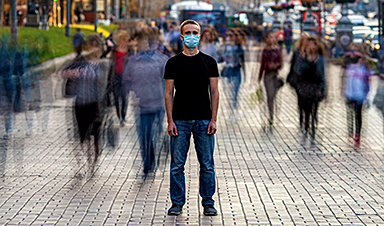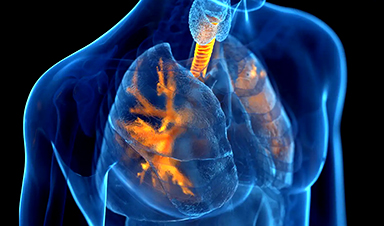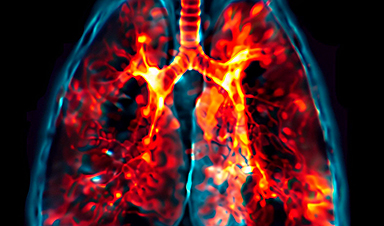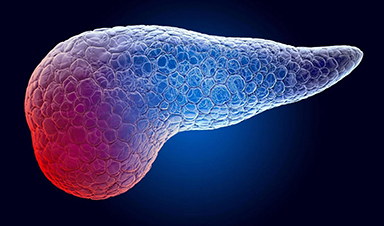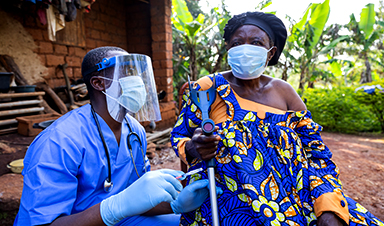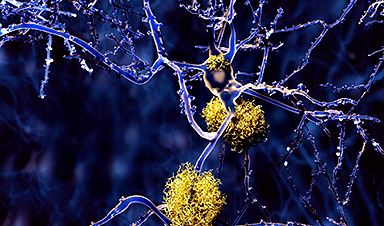Matt Fitzgerald used to bike up and down 3,500 feet through the Santa Ana Mountains on three-hour rides just for fun. Now, nine months after being infected with SARS-CoV-2, the virus that causes Covid-19, he can’t muster walking on flat surfaces for 20 minutes without days of exhaustion.
“My long Covid life remains terrifying,” he told me. “Last weekend I washed my car, dried it, put it back in the garage. Then I got violently sick, could hardly get up to get food. I was unable to read or even call my mom. I’m a shell of myself. But my physical issues aren’t half as bad as my brain problems. It’s hard to describe. You can say brain fog, but that doesn’t come close to doing it justice.”
Another patient of mine, Barbara Nivens, was forced into early retirement as a result of long Covid. Four months after recovering from a mild case of Covid-19, “My memory began to fade,” she told me. “I struggled cognitively as a manager and then HR came after me.”
It’s no wonder that depression and PTSD rates are up in people living with long Covid. There are no approved therapies for the physical or cognitive disabilities that now plague 65 million people around the world, a conservative estimate given the degree of undocumented cases. It is now clear from U.S. and U.K. investigations of approximately 2,000 previously hospitalized Covid patients that six months later more than half have problems managing finances and paying bills as well as completing everyday activities like preparing meals, bathing, getting dressed, or walking across a room.
But what exactly is going on inside the brains of these people from a biological and pathological perspective?
Autopsy studies show that the virus can persist in some people for many months even though they have no symptoms and test negative for the virus. Brains donated by people who died of Covid-19 also show widespread problems in the cells lining the blood vessels and exaggerated clotting, supporting the idea of Covid-19 as a blood flow disorder that brings on brain disease.
Perhaps the most harrowing thing I have done in 30 years as a physician-scientist has been to ask family members I’d never met, often in the middle of the night via telephone during the height of the Covid surges, if I and my colleagues could study their loved one’s brain. In a study we conducted of 20 of these priceless brain donations, we found brain swelling due to decreased blood flow and heightened activity in microglial cells, the so-called white matter in brains that support the neurons that transmit thoughts and help store information. We saw this even in young previously healthy individuals.
A study from the National Institutes of Health of 44 complete autopsies mapped and quantified the distribution of SARS-CoV-2 and showed it was widely distributed throughout the body, including in the hypothalamus and cerebellum in the brain and neurons in the spinal cord. Especially relevant to long Covid, viral fragments were detected in some of the brains of people who died many months after symptom onset.
Evidence that the virus can persist in some people has inspired the design of multiple long Covid treatment trials with Paxlovid. The authors of the NIH autopsy study concluded: “Here we provide the most comprehensive analysis to date of cellular tropism, quantification & persistence of SARS-CoV-2 across the human body including the brain.”
Tropism? That is when cells are involuntarily directed by a stimulus, like a virus, to turn and march in a new, potentially pathological direction. Could it be that instead of returning to a healthy state, the brains of people with long Covid have been redirected toward a type of premature aging or senescence?
In their own words
Nivens, who retired from retail management at age 59, has been diagnosed by her neurologist as having rapid onset dementia due to Covid-19. An incredibly thorough medical work-up found no plausible causes for this dementia other than its onset following her Covid infection, which she contracted before the vaccine was available.
Fitzgerald, age 26, is a mechanical engineer who worked for Tesla and now designs surgical devices — when he can. Since recovering from his initial bout with Covid-19, he’s developed a condition characteristic of myalgic encephalomyelitis/chronic fatigue syndrome (ME/CFS) known as post-exertional malaise, which is why even slight exertion leaves him and millions like him inexplicably incapacitated.
Here’s how they describe their lives today:
Barbara Nivens
“I walk down the hall and see dozens of pictures of family trips and feel like a ghost because I don’t remember any of them. Now I’m trying to figure out who Barbara 2.0 is going to be.” (Her husband, tearing up as he listened to her, said softly, “I just want my wife back.”)
To help rebuild her memory, Nivens does brain exercises including the Color Bee game. “It’ll tell you, for the bee to go in ‘Click on all the green leaves.’ And then I’ll find myself clicking on the orange and the yellow instead of the green, and then I kill my bee, and you only get three bees.
“We were doing puzzles, so I put one in the den and sometimes just to find one piece it would take me 45 minutes to an hour. Because I would think I would know what I was looking for, and then all of a sudden, I forget. It makes me think I’m crazy.”
Matt Fitzgerald
“I feel like I’m underwater. When you talk to me, I can hear you, but my brain does not understand the words. I can’t comprehend what you’re saying. I have no intellectual capacity or energy to digest data.
“At work my brain is just begging for rest. I struggle with finding words and completing tasks in a timely manner. It’s the worst. I’ll be in a meeting and know exactly what I want to say before I say it. I’ll start saying it and I’ll get to a word, and I just cannot think of the word. I’ll just be like, ‘Give me a moment,’ and I’ll go through my brain cycling through words. This week it was consistent. I couldn’t think of the word consistent. I kept thinking it was coincident or concentric or constant.”
“I used to build prototypes multiple days a week and now, if I do anything in the lab, I’m pretty much wiped out for a week. It’s terrifying. I mean, I’ve had to dig real deep. How much longer will I feel like this? I’m scared.”
Lifting the stigma
Such problems in executive function, memory, and processing speed are what many people complain about in the long Covid support groups colleagues and I developed and provide weekly for free to Long Covid survivors from around the country as part of the Critical Illness, Brain Dysfunction, and Survivorship Center at Vanderbilt University Medical Center and the Nashville VA Medical Center.
Science validates their injuries. A picture is emerging from animal models showing how ongoing inflammation of glial cells disrupts the electrical conduction highways in the brain’s white matter that link to and support the neurons in gray matter. It’s as if the bridges (white matter) linking different territories of the brain have been blown up and the land itself (nerves in the cerebral cortex and hippocampus) become scorched, leaving people with long Covid plagued by thinking and memory deficits.
An MRI study from George Washington University of people who’d had mild Covid-19 symptoms several months earlier found much less gray matter in their brains than they should have had. This ominous finding complements a large controlled study conducted as part of the U.K. Biobank showing that, as compared to people who had never tested positive for SARS-CoV-2, a loss of actual brain tissue was seen in the olfactory cortex and limbic system — think impaired smell, emotions, and memory formation — among people with long Covid.
This tracks with PET scan studies of people with long Covid showing impaired cellular metabolism in the frontal lobe six months following acute Covid. Other long Covid studies using PET scans correlate this slower metabolism with numerous functional problems and symptoms — ongoing issues with smell, memory, cognitive abilities, chronic pain, and sleep disruption — that harms quality of life.
Long Covid is now considered to be a disability by the U.S. Department of Health and Human Services, but the reality is that most people have great difficulty qualifying to receive financial resources. They feel left behind and too often find themselves jobless.
As they wait for results from ongoing and future clinical trials, Nivens, Fitzgerald, and others like them focus on cognitive rehabilitation using brain exercises like crossword puzzles, Bananagrams, and Sudoku. But because of the dicey and unpredictable elements of post-exertional malaise, long Covid patients with ME/CFS must learn the daily art of pacing themselves.
As the public health disaster of long Covid unfolds, everyone can play a part. We can validate the suffering of people who are all too often stigmatized and disbelieved even by medical professionals. We can help friends and loved ones find their voices as the experts of their own illness. And, most of all, we need to start talking more about long Covid as the emergency it is for those living with it, for the leaders of families who now feel like they are failing those who depend on them, for the work force, and beyond.
On a personal level, every American can take steps to reduce the likelihood of getting Covid, or long Covid. A study of 440,000 people with a single Covid infection, 40,000 with multiple infections, and 5 million controls who never had Covid found more death and long Covid after multiple Covid infections. If advised by your physician, get the new bivalent vaccine and wear masks in indoor public spaces such as theaters and airplanes.
News
Baffling Scientists for Centuries: New Study Unravels Mystery of Static Electricity
ISTA physicists demonstrate that contact electrification depends on the contact history of materials. For centuries, static electricity has intrigued and perplexed scientists. Now, researchers from the Waitukaitis group at the Institute of Science and [...]
Tumor “Stickiness” – Scientists Develop Potential New Way To Predict Cancer’s Spread
UC San Diego researchers have developed a device that predicts breast cancer aggressiveness by measuring tumor cell adhesion. Weakly adherent cells indicate a higher risk of metastasis, especially in early-stage DCIS. This innovation could [...]
Scientists Just Watched Atoms Move for the First Time Using AI
Scientists have developed a groundbreaking AI-driven technique that reveals the hidden movements of nanoparticles, essential in materials science, pharmaceuticals, and electronics. By integrating artificial intelligence with electron microscopy, researchers can now visualize atomic-level changes that were [...]
Scientists Sound Alarm: “Safe” Antibiotic Has Led to an Almost Untreatable Superbug
A recent study reveals that an antibiotic used for liver disease patients may increase their risk of contracting a dangerous superbug. An international team of researchers has discovered that rifaximin, a commonly prescribed antibiotic [...]
Scientists Discover Natural Compound That Stops Cancer Progression
A discovery led by OHSU was made possible by years of study conducted by University of Portland undergraduates. Scientists have discovered a natural compound that can halt a key process involved in the progression [...]
Scientists Just Discovered an RNA That Repairs DNA Damage – And It’s a Game-Changer
Our DNA is constantly under threat — from cell division errors to external factors like sunlight and smoking. Fortunately, cells have intricate repair mechanisms to counteract this damage. Scientists have uncovered a surprising role played by [...]
What Scientists Just Discovered About COVID-19’s Hidden Death Toll
COVID-19 didn’t just claim lives directly—it reshaped mortality patterns worldwide. A major international study found that life expectancy plummeted across most of the 24 analyzed countries, with additional deaths from cardiovascular disease, substance abuse, and mental [...]
Self-Propelled Nanoparticles Improve Immunotherapy for Non-Invasive Bladder Cancer
A study led by Pohang University of Science and Technology (POSTECH) and the Institute for Bioengineering of Catalonia (IBEC) in South Korea details the creation of urea-powered nanomotors that enhance immunotherapy for bladder cancer. The nanomotors [...]
Scientists Develop New System That Produces Drinking Water From Thin Air
UT Austin researchers have developed a biodegradable, biomass-based hydrogel that efficiently extracts drinkable water from the air, offering a scalable, sustainable solution for water access in off-grid communities, emergency relief, and agriculture. Discarded food [...]
AI Unveils Hidden Nanoparticles – A Breakthrough in Early Disease Detection
Deep Nanometry (DNM) is an innovative technique combining high-speed optical detection with AI-driven noise reduction, allowing researchers to find rare nanoparticles like extracellular vesicles (EVs). Since EVs play a role in disease detection, DNM [...]
Inhalable nanoparticles could help treat chronic lung disease
Nanoparticles designed to release antibiotics deep inside the lungs reduced inflammation and improved lung function in mice with symptoms of chronic obstructive pulmonary disease By Grace Wade Delivering medication to the lungs with inhalable nanoparticles [...]
New MRI Study Uncovers Hidden Lung Abnormalities in Children With Long COVID
Long COVID is more than just lingering symptoms—it may have a hidden biological basis that standard medical tests fail to detect. A groundbreaking study using advanced MRI technology has uncovered significant lung abnormalities in [...]
AI Struggles with Abstract Thought: Study Reveals GPT-4’s Limits
While GPT-4 performs well in structured reasoning tasks, a new study shows that its ability to adapt to variations is weak—suggesting AI still lacks true abstract understanding and flexibility in decision-making. Artificial Intelligence (AI), [...]
Turning Off Nerve Signals: Scientists Develop Promising New Pancreatic Cancer Treatment
Pancreatic cancer reprograms nerve cells to fuel its growth, but blocking these connections can shrink tumors and boost treatment effectiveness. Pancreatic cancer is closely linked to the nervous system, according to researchers from the [...]
New human antibody shows promise for Ebola virus treatment
New research led by scientists at La Jolla Institute for Immunology (LJI) reveals the workings of a human antibody called mAb 3A6, which may prove to be an important component for Ebola virus therapeutics. [...]
Early Alzheimer’s Detection Test – Years Before Symptoms Appear
A new biomarker test can detect early-stage tau protein clumping up to a decade before it appears on brain scans, improving early Alzheimer’s diagnosis. Unlike amyloid-beta, tau neurofibrillary tangles are directly linked to cognitive decline. Years [...]







